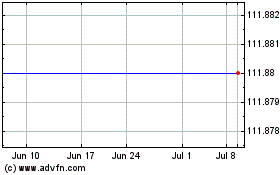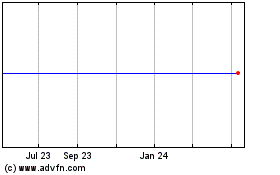By Kimberly Chin
A small group of niche investors guided by environmental, social
and governance principles are emerging as a big influence on
corporate decision making.
These investors -- religious funds, boutique asset managers and
single-issue organizations -- are routinely punching above their
weight in driving companies in their portfolios to address
sustainability issues and ethical concerns. They're doing so by
filing frequent shareholder resolutions and pushing other
shareholders, including asset managers many times their size, to
play along.
These smaller asset managers "have an explicit mandate from
their investors to advance environmental and social performance at
their investing companies," says Jackie Cook, director of
sustainable stewardship research at Morningstar Inc.
A measure of their success in fulfilling that mandate is getting
the big index-fund providers on board with their initiatives. The
Big Three -- BlackRock Inc., Vanguard Group and State Street Corp.
-- collectively control an average of one in five shares of the
S&P 500 companies, giving them an outsize role in voting power
and influence, according to a working paper published in June by
the National Bureau of Economic Research. The three firms together
are responsible for 25% of the shareholder votes cast at S&P
500 companies and 22% of the votes cast at Russell 3000 companies,
the researchers found. Niche investors have frequently sought to
gain the backing of large index funds in the pursuit of
environmental and social initiatives as a way to amplify their
message and increase pressure on companies. In some cases, they
succeed.
Seeing results
About one-third of ESG resolutions are filed by self-identified
socially responsible investors, the largest group to do so,
followed by pension funds and faith-based managers, according to
the Sustainable Investments Institute, a nonprofit that tracks
resolutions and proxy votes.
In 2017, sustainability-focused investors asked energy
infrastructure company Kinder Morgan Inc. to start measuring,
monitoring and setting reduction targets for methane gas emissions
across the company's operations. The resolution was co-filed by
Robeco Institutional Asset Management BV, employee-owned investment
firm Miller/Howard Investments Inc. and faith-based asset manager
Mercy Investment Services Inc. "We are long-term shareholders,"
says Carola van Lamoen, head of active ownership at Robeco. "We
engage for change because we are convinced that it is in the
long-term interest of the company." The proposal came up to a vote
at last year's annual shareholders' meeting.
Though their specific proposal didn't pass, the methane
reduction targets were eventually included as part of a broader
resolution calling for a sustainability report that got a majority
of votes. Both resolutions garnered the support of BlackRock,
Vanguard and State Street.
In October 2018, Kinder Morgan published its first formal report
giving more details on its methane emission reduction
practices.
Calvert Research & Management, a subsidiary of Eaton Vance
Corp. that manages ESG funds, filed a shareholder resolution with
railroad company Genesee & Wyoming Inc. in December 2017
requesting the company set reduction targets for greenhouse-gas
emissions. The resolution got a 57% vote of support at the
company's general meeting in 2018, and was backed by the Big Three.
The company subsequently published a sustainability report and
indicated its intention to adopt carbon-reduction goals.
Getting shareholder resolutions in front of management and
boards helps niche funds set themselves apart. When it comes to
voting the proxies on ESG proposals, these investors have a much
better record compared with the ESG-focused funds at bigger asset
management firms, which often cast votes that conflict with their
sustainability mandate, says Morningstar's Ms. Cook.
A BlackRock spokesman says the firm's voting record reflects a
thoughtful approach to ESG initiatives. "Just because something
says 'climate,' we're not going to automatically vote on it," he
says. "We don't want to be a rubber stamp. We don't think that's
good stewardship."
Toward diplomacy
Overall, the number of ESG shareholder resolutions that have
come to a vote has gone down in recent years. But the number of
proposals withdrawn has risen, indicating investors' success in
getting managers to engage in dialogue before initiatives get as
far as the ballot -- an approach embraced both by niche investors
and the biggest fund firms.
Nearly half of all environmental-related proposals were
withdrawn in advance of 2019 meetings, compared with 33% two years
ago, according to ISS Analytics, the data arm of proxy-advisory
firm Institutional Shareholder Services. There seems to be a
"greater willingness on the part of companies and proponents to
negotiate outcomes on environmental topics," says Peter Kimball,
head of advisory services at ISS Corporate Solutions, a corporate
governance and sustainability consultancy. Around 45% of
shareholder proposals related to social issues were withdrawn last
year, up from 34% two years earlier, according to ISS.
While the large asset managers say they don't file resolutions
on ESG issues or any other topic, they aren't sitting on the
sidelines, either. The firms say they engage directly with
management and boards to press them on ESG issues. Direct
engagement gives a company a better understanding of the risks and
helps it create pathways to address these issues, they say.
"Having that open dialogue with a company is going to be more
insightful and produce better outcomes" than a more adversarial
approach, says a BlackRock spokesman.
Niche investors say they see value in diplomacy as well. But
they also don't always have the clout to successfully negotiate
with a company. As a result, shareholder resolutions are often seen
as a last resort to get a company's attention on an issue or to
push it toward further discussion when initial discourse doesn't
pan out.
Still, companies are more responsive to engaging with their
shareholders today, says Anthony Eames, the director of responsible
investment strategy at Calvert. He says Calvert is filing fewer
resolutions and having more meaningful dialogues with companies.
"Companies are more sensitive to areas where they're not
performing," he says, citing the influence of social media on
today's corporate policy.
Ms. Chin is a Wall Street Journal reporter in New York. Email
kimberly.chin@wsj.com.
(END) Dow Jones Newswires
September 22, 2019 22:17 ET (02:17 GMT)
Copyright (c) 2019 Dow Jones & Company, Inc.
Genesee and Wyoming (NYSE:GWR)
Historical Stock Chart
From Mar 2024 to Apr 2024

Genesee and Wyoming (NYSE:GWR)
Historical Stock Chart
From Apr 2023 to Apr 2024
